We may not have the course you’re looking for. If you enquire or give us a call on +33 805638382 and speak to our training experts, we may still be able to help with your training requirements.
We ensure quality, budget-alignment, and timely delivery by our expert instructors.
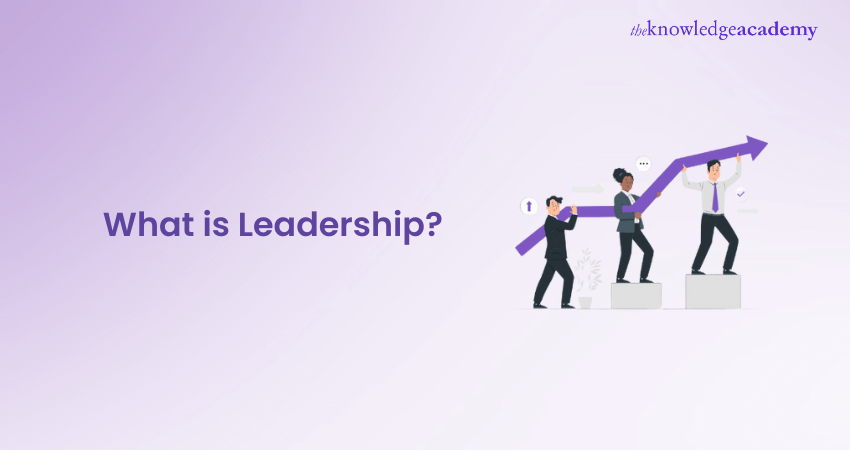
Leadership isn't just a title reserved for some organisational hierarchy - it's the essential ability to inspire passion, action and change for transforming individuals and the world. A true leader is a master at influencing, innovating and setting a goal so visionary that others can't help but follow.
This blog explores the fundamental essence of What is Leadership, shedding light on its importance, the various leadership styles and more. So read on and prepare to leave a lasting legacy as a leader!
Table of Contents
1) Understanding Leadership
2) What is the Importance of Leadership?
3) Qualities of Effective Leaders
4) Leadership Styles
5) Leadership vs Management
6) How to Become a Better Leader?
7) Conclusion
Understanding Leadership
Leadership refers to the ability of an individual or a group of people to inspire and guide members of an organisation, society or team. While leadership is often tied to a person's ranking in a hierarchy, it's an attribute anyone can attain, even those without leadership positions. Compassionate Leadership is a skill that can be developed and improved over time, benefiting both individuals and teams.
Leaders are essential in various aspects of society, including politics, religion, business, and social and community-based organisations. Boss vs Leader dynamics often highlight how leaders make sound and difficult decisions. They are individuals who can articulate a clear vision, set achievable goals, and provide followers with the knowledge and tools necessary to reach them.
What is the Importance of Leadership?
Making tough decisions is often essential for the success and growth of a business. Therefore, businesses rely on leaders with strong competencies and Emotional Intelligence (EI) to navigate these challenges effectively. Leadership and Organisational Behaviour PDF highlights how leadership skills become even more crucial during times of crisis. Let's delve deeper into the significance of leadership.
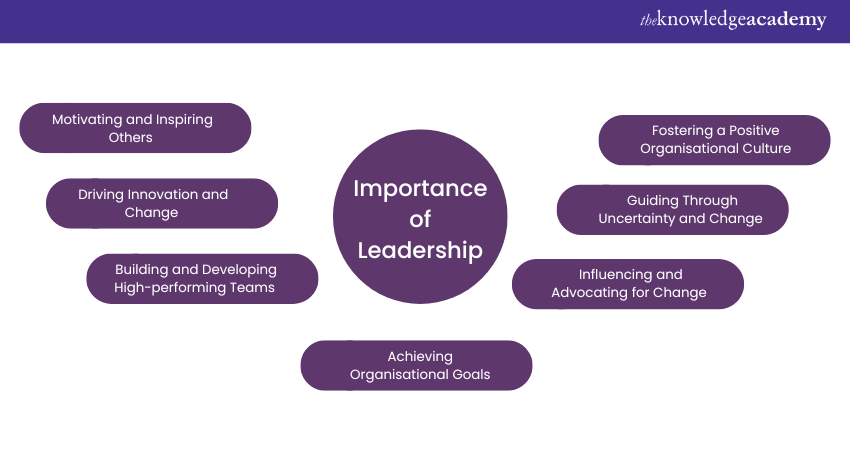
1) Driving Innovation and Change
Fostering innovation and change is crucial for organisations' and communities' continual growth and sustainability. Leaders with an innovative mindset can cultivate an environment that encourages creativity, risk-taking, and novel ideas. They empower teams through positive mindsets and curiosity to pose out-of-the-box questions.
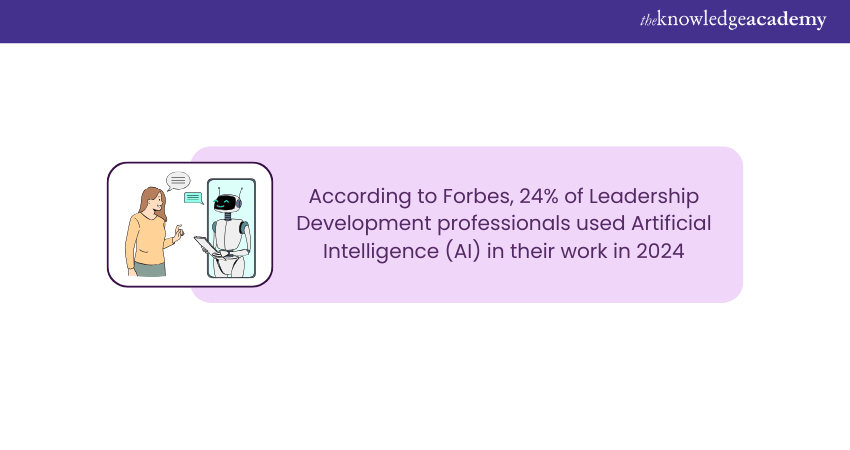
2) Building and Developing High-performing Teams
Outstanding Leadership plays a key role in developing the productivity and performance levels within the team. Influential Leaders understand the value of collaborating with people from diverse cultural backgrounds and sharing different skills and ideas. They create a welcoming space where every team member feels valued and involved. This helps cultivate the best in their team and drives organisational success.
3) Achieving Organisational Goals
Leadership is crucial for to motivate team members toward organisational goals and strategic initiatives. Leaders provide direction and clarity by articulating a compelling vision and establishing achievable objectives. They align the efforts of individuals towards a shared purpose and mobilise resources. Their ability to make informed decisions, solve problems, and navigate challenges is instrumental in overcoming obstacles and steering the organisation towards success.
4) Fostering a Positive Organisational Culture
Leaders are essential in changing the culture of their teams. They set an exemplary example for their team by fostering values like honesty, openness, and respect. Additionally, they are able to foster an atmosphere of cooperation and inclusivity where diverse perceptions are respected and treasured.
5) Guiding Through Uncertainty and Change
The role of the leader becomes even vital critical during uncertain times and sudden organisational changes. Their performance during such times promotes a sense of stability, guidance, and direction. They never lose their calmness, communicate openly, and constantly motivate their teams. By demonstrating resilience and adaptability, Leaders can inspire confidence and help individuals navigate ambiguity and adversity.
6) Influencing and Advocating for Change
Effective leaders drive positive change within their communities and society by leveraging their influence and platforms. They address social issues, promote inclusivity, and support initiatives aligned with their values. By collaborating with Stakeholders and forming strategic alliances, they help shape society and leave a lasting impact on the world around them.
Want to empower your team to be at their best? Learn how to create a positive business environment in our Leadership and Management Skills Course!
Characteristics of an Effective Leader
Effective leaders possess unique qualities that enable them to inspire, guide, and bring out the best in their teams. To explore these leadership traits in more depth, refer to our Characteristics of Leadership PDF as a comprehensive resource. Let’s delve into some of the key qualities that define effective leaders.
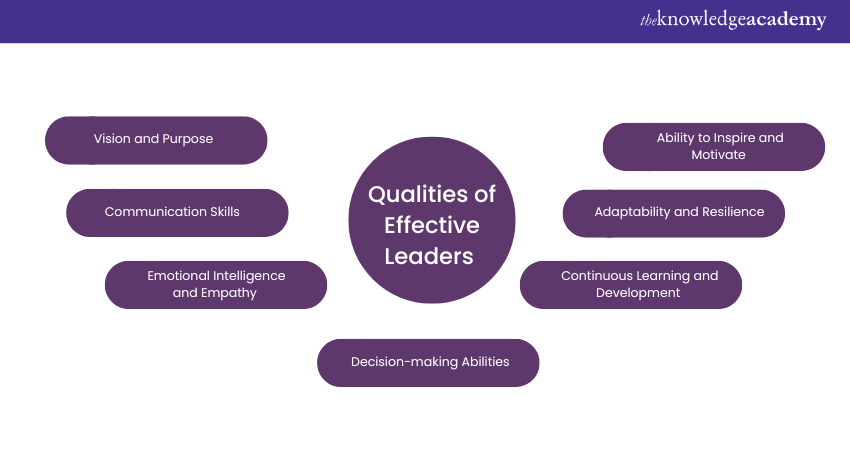
1) Vision and Purpose
One of the fundamental qualities of effective Leaders is their sense of clear vision and a purpose. They must be able to demonstrate their forward-thinking ability and able to articulate a compelling vision that motivates others.
2) Communication Skills
Strong Communication Skills are the fundamental requirement for effective Leadership. A leader must be able to convey ideas, expectations, and feedback clearly and transparently. They must be proficient in both speaking and writing abilities to ensures their messages are clearly understood and valued.
3) Emotional Intelligence and Empathy
Effective Leaders must demonstrate Emotional Intelligence and empathy. This enables them to understand and connect with their team members' emotions and experiences. They need to be able to imagine themselves in their teammates' positions to demonstrate genuine concern and affection.
4) Decision-making Abilities
Leaders often face challenging decisions that impact the performances of their teams. They should possess the strong combination of Decision-Making Skills, Analytical Thinking, and intuition.
Want to unlock your true leadership potential? Sign up for our Leadership Skills Course now!
5) Ability to Inspire and Motivate
Effective Leaders must be inspiring and should motivate their teams to push beyond conventional boundaries. They must nurture a supportive work environment where every team member feels valued and appreciated.
6) Adaptability and Resilience
Effective Leaders must also demonstrate adaptability and Resilience. They should embrace change, navigate uncertainty, and inspire confidence in their teams during challenging times. Additionally, they must remain agile and flexible, able to adjust their strategies and approaches as needed while keeping the overall vision in mind.
7) Continuous Learning and Development
Effective Leaders are effective learners who remain committed to continuous personal and professional development. They must actively search for opportunities to expand their knowledge, skills, and perspectives.
Master the art of People Management and team Leadership – sign up for our Successful People Management and Team Leadership Course today!
Leadership Styles
This table summarises the prominent leadership styles practiced in businesses and organisations across industries:
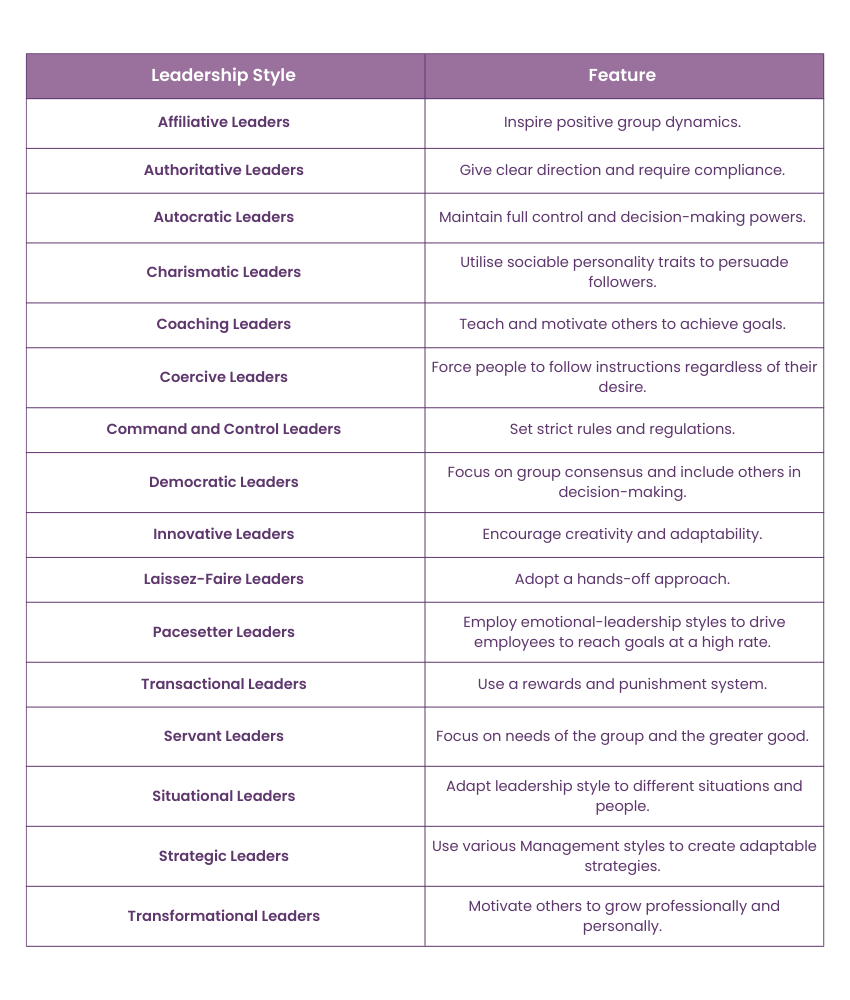
Leadership Vs Management
Leadership and Management can be termed the two sides of the same coin. The differences between Leadership and Management are tabulated below.
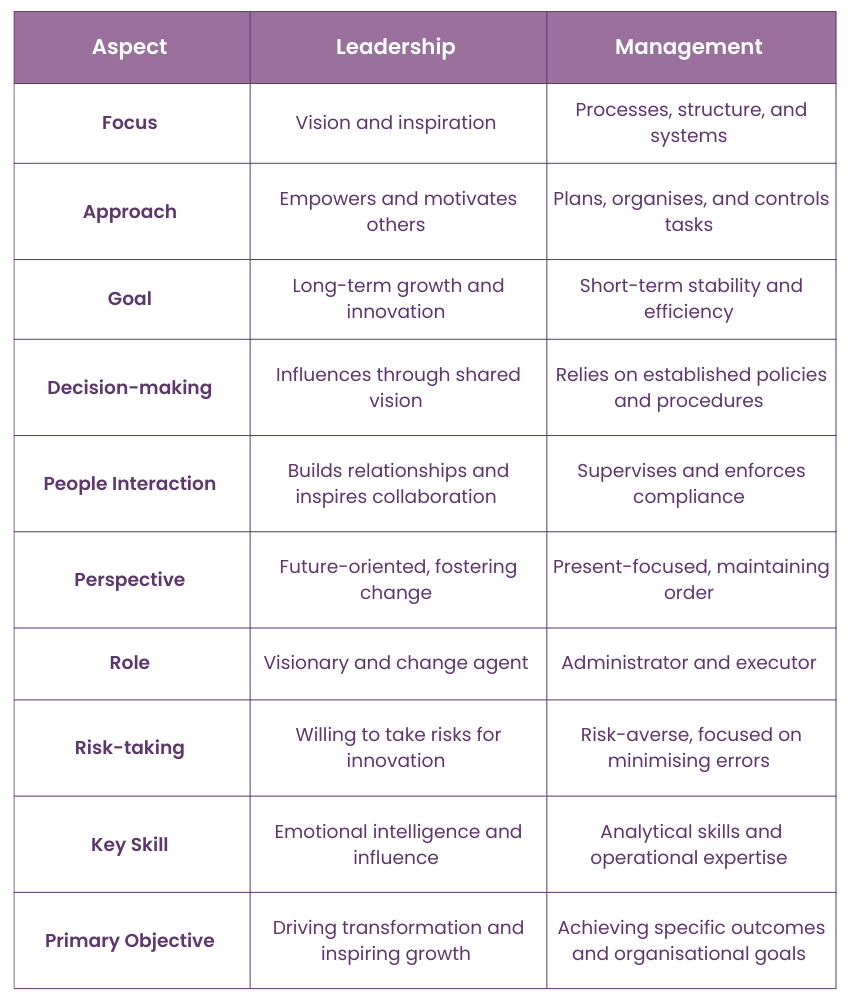
Leverage AI technology to elevate your leadership skills in our Certified Artificial Intelligence for Leaders Training - Sign up now
How to Become a Better Leader?
Now that you have understood “What is Leadership?” and its significance, let’s explore the critical Leadership Skills that are important for effective leadership. Preparing for Leadership Interview Questions can also help you identify key skills that employers look for. Referring to the Leadership Tools Guide can provide valuable insights into essential strategies and techniques for honing leadership abilities. Here are a few actionable steps to develop Leadership Skills and elevate your Leadership Quality: Here are a few actionable steps to develop Leadership Skills and elevate your Leadership Quality:
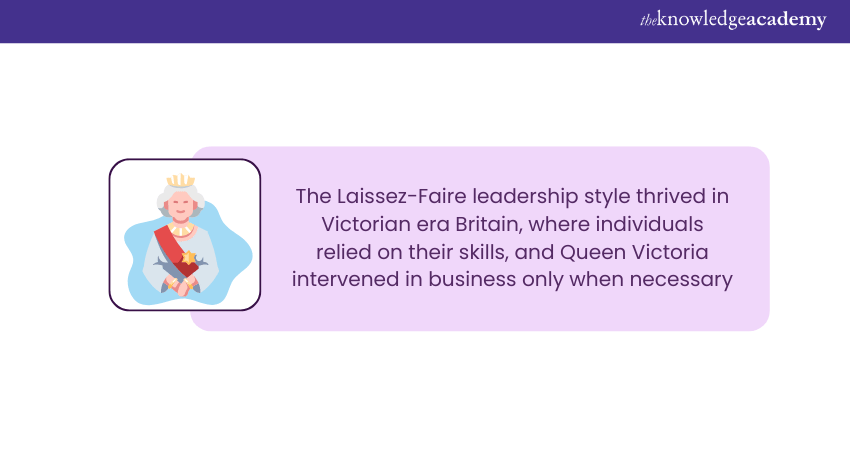
1) Engage in Continuous Self-reflection: Cultivate self-awareness within yourself, a fundamental aspect of effective Leadership. Reflect on your strengths, weaknesses, values, and goals regularly. Evaluate how your actions align with your Leadership vision and actively seek improvement opportunities.
2) Embrace Feedback and Constructive Criticism: Foster an environment of openness and transparency by encouraging constructive feedback from your team, peers, and superiors. This feedback and criticism serve as valuable tools for personal growth and the identification of blind spots and areas in need of improvement.
3) Seize Leadership Opportunities: Identify leadership prospects within your personal and professional environments. Volunteer for challenging projects, assume leadership roles in community organisations and take charge to provide direction to your team.
4) Embrace Mentorship and Coaching: Seek support from mentors and coaches who can offer career-driven insights, share their past experiences, and challenge your perspectives. Additionally, try mentoring someone else by reinforcing your own leadership skills.
5) Lead by Example: Demonstrate the behaviour you wish to see in your team. Exhibit integrity, a strong work ethic, and unwavering commitment to your values. This aligns with the principles of Leadership in Organisational Behaviour, as it not only establishes a positive example but also cultivates trust and respect among team members.
Conclusion
In conclusion, true leadership goes beyond mere authority, as it focuses on vision, empathy, and empowerment. A true leader inspires growth, fosters stronger collaboration, and adapts to challenges with resilience. Understanding what leadership is and applying a Leadership Development Framework means having the key to drive positive change and unlock both individual and team potential. For further insights, explore our comprehensive Leadership Styles PDF to guide your journey toward impactful leadership.
Take your Leadership skills to the next level by signing up for our Leadership Courses today!
Frequently Asked Questions
What are the Key Skills of Leadership?

Key leadership skills include:
a) Communication
b) Relationship building
c) Decision-making
d) Conflict Management
e) Negotiation
f) Critical thinking
g) Self-awareness
h) Adaptability
What are the Types of Leadership?

There are several kinds of Leadership styles, including:
a) Autocratic
b) Democratic
c) Laissez-Faire
d) Transformational
e) Transactional
f) Situational
What are the Other Resources and Offers Provided by The Knowledge Academy?

The Knowledge Academy takes global learning to new heights, offering over 3,000 online courses across 490+ locations in 190+ countries. This expansive reach ensures accessibility and convenience for learners worldwide.
Alongside our diverse Online Course Catalogue, encompassing 19 major categories, we go the extra mile by providing a plethora of free educational Online Resources like News updates, Blogs, videos, webinars, and interview questions. Tailoring learning experiences further, professionals can maximise value with customisable Course Bundles of TKA.
What is The Knowledge Pass, and How Does it Work?

The Knowledge Academy’s Knowledge Pass, a prepaid voucher, adds another layer of flexibility, allowing course bookings over a 12-month period. Join us on a journey where education knows no bounds.
What are the Related Courses and Blogs Provided by The Knowledge Academy?

The Knowledge Academy offers various Leadership Courses, including Leadership Skills Training, Leadership and Management Course, and many more. These courses cater to different skill levels, providing comprehensive insights into Difference Between Teaching and Coaching.
Our Business Skills Blogs cover a range of topics related to Leadership, offering valuable resources, best practices, and industry insights. Whether you are a beginner or looking to advance your Leadership Skills, The Knowledge Academy's diverse courses and informative blogs have you covered.
Upcoming Business Skills Resources Batches & Dates
Date
 Successful People Management and Team Leadership
Successful People Management and Team Leadership
Fri 16th May 2025
Fri 25th Jul 2025
Fri 29th Aug 2025
Fri 10th Oct 2025
Fri 28th Nov 2025






 Top Rated Course
Top Rated Course



 If you wish to make any changes to your course, please
If you wish to make any changes to your course, please


